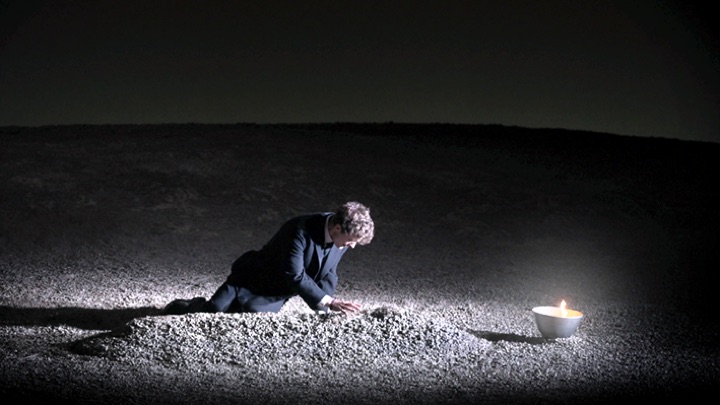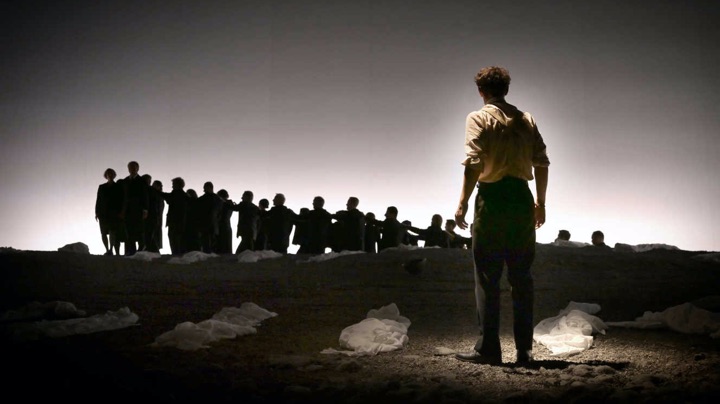

When I saw Jamie Barton sing the role at the Metropolitan Opera in 2019 (as a trouser role, of course), it sounded like the role was written explicitly for her.
Sadly, this was not the case at Wednesday night’s performance of Gluck’s opera at the Théâtre Champs-Élysées. Jakub Józef Orlinski gave an impassioned if rather strained Paris mainstage debut in a role that always felt a little too large for the countertenor’s delicate vocal stylings.
Of course, no modern singer can approach the kind of vocal performance that Gluck intended for the role of Orfeo. Nor should they want to. With a number of excellent alternatives to the castrato voice (a mezzo-soprano, a countertenor, the 1774 tenor version, or even the 1769 soprano version), there are plenty of ways to enjoy Gluck’s opera today.
Orlinski did, indeed, bring much finesse and beauty to the role. The quieter moments were crowned with silvery clarity, especially in the middle register – which balanced sweetness and sangfroid. His musicality, too, was top-notch: sudden bursts of raw emotion in the stage action never interrupted the forlorn elegance of his phrasing.
But there were also moments of audible tension, especially in louder passages: a tremor or a wobble here and there, a few notes in the upper register that sounded pressed and nasal. The lower register often didn’t sound at all (unfortunate, given that Gluck dips down there in Orfeo’s opening cries of “Euridice”!); he was occasionally drowned out by the horns or woodwinds.
My impression was of a very fine singer performing a role that was slightly too large for him. I would love to hear him again in some lighter countertenor fare.
Regula Mühlemann gave a spirited, hot-blooded performance as Euridice despite suffering from illness. She sang the role admirably despite understandable difficulty, with a resonant upper register that shone through regardless.
Elena Galitskaya’s Amore was truly a revelation: dressed en travesti in Act I and en femme in Act III, Galitskaya’s Amore had a rare maturity, forgoing the cutesy pastoral stereotypes that go with the role in favor of something more severe. This was a weighty, no-frills vocal interpretation, aided by Robert Carsen’s direction, which has Amore act as a kind of sinister puppet master to the hapless Orfeo.
Which leads me to the true star of the performance: Carsen’s production – an austere, genuinely spinechilling affair that takes place entirely on a harsh, desolate rockface. A series of creepy, ascetic montages – a slow-moving funeral procession, an array of body-bags, an empty grave – provide the perfect backdrop for a dramatically precise, emotionally intimate, and visually striking production.
Carsen’s production cuts much of the ballet music from the 1762 version of Gluck’s opera – which was a shame, because the Orchestre Balthasar Neumann (conducted by maestro Balthasar Neumann himself) sounded absolutely exquisite.
This was a crisp, exacting performance of Gluck’s score, cleanly and expertly coordinated. But Neumann also left room for exaggeration and expressivity, very much in keeping with the sensibilité of reform opera: you could have heard a pin drop in the pianissimos; it felt like time had stopped during the adagios.
I particularly enjoyed the second orchestra in the first act (which Gluck marks as “echo”), which was tenderly performed by a small coterie of players from the back of the theater. This small moment captured, for me, the attentiveness to nuances of orchestral color present throughout the entire performance: flashes of woodwind, brass, or pizzicato had enormous dramatic impact – especially when paired with the asceticism of Carsen’s production.


























Comments